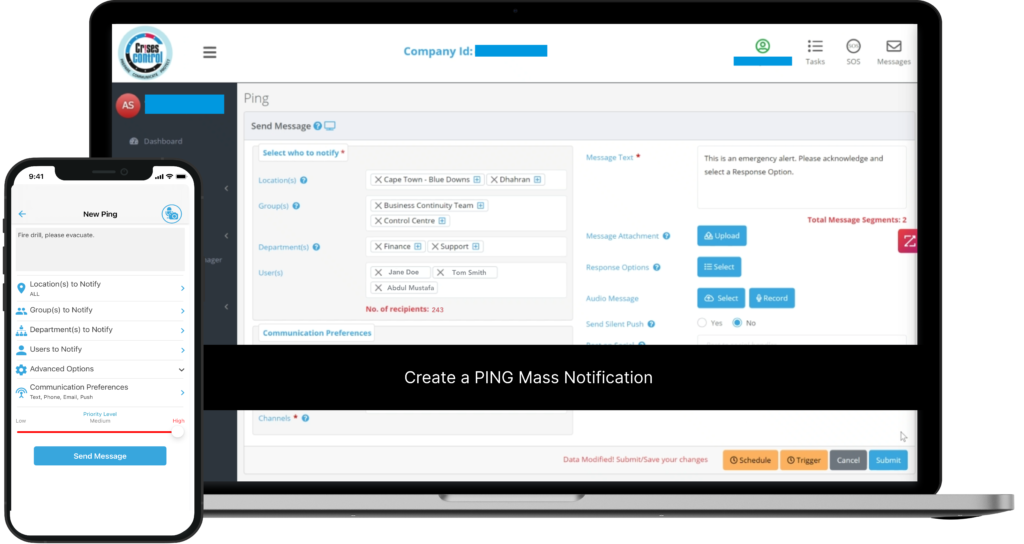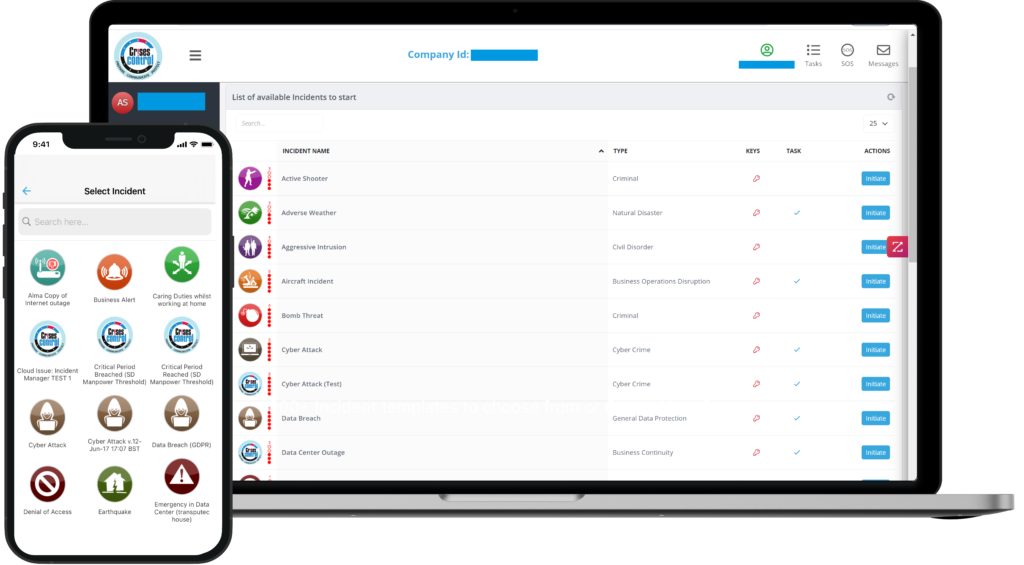Cloud-Based Emergency Communication Systems for Saudi Government
Written by Anneri Fourie | Marketing Executive
In Saudi Arabia’s fast-paced government sectors, effective crisis management is essential. From natural disasters to cyberattacks and public safety emergencies, the ability to respond quickly and coordinate efforts is critical. However, many government agencies still rely on outdated communication methods, leading to delayed responses and uncoordinated actions that can worsen crises.
Enter cloud-based emergency communication systems—technology that revolutionises how governments handle emergencies. These systems help enhance response times, improve decision-making, and ensure seamless coordination across all levels of government.
In this blog, we’ll explore the crucial role of cloud-based emergency communication systems within the Saudi government and how Crises Control offers unique, tailored solutions to meet these needs.
The Urgent Need for Modern Crisis Management in Saudi Government Sectors
Outdated Communication Methods: A Persistent Problem
Saudi government agencies often face challenges in managing crises due to outdated communication methods. Traditional systems like landlines, emails, and manual alerts are slow and unreliable, especially during emergencies when every second counts. These outdated approaches can cause significant delays, uncoordinated actions, and an overall increase in the impact of crises.
Rising Threats Demand Proactive Solutions
From severe weather events, like flash floods, heatwaves and sandstorms, and cyber threats to public health emergencies, the types of crises faced by Saudi government sectors are growing in complexity. This increasing threat landscape demands proactive crisis management approaches and advanced communication solutions that provide real-time updates, enable quick responses, and streamline decision-making processes.
Key Features of Cloud-Based Emergency Communication Systems
Real-Time Alerts and Notifications
Cloud-based emergency communication systems allow instant notifications to be sent to the right people at the right time. Unlike traditional methods, these alerts can be delivered through multiple channels—SMS, email, voice calls, and mobile app notifications—ensuring critical messages are never missed.
Centralised Crisis Management Dashboard
These systems provide a centralised dashboard that offers a complete view of ongoing incidents, available resources, and team status. This unified platform enables crisis managers to make informed decisions, monitor progress in real-time, and adjust strategies as situations evolve.
Automation of Crisis Response Protocols
Automation plays a significant role in modern crisis management. Cloud-based systems allow the pre-configuration of response protocols, which can be automatically activated when a crisis occurs. This reduces human error, accelerates response times, and ensures consistent execution of crisis management plans.
Scalability and Flexibility
Cloud-based communication systems are highly scalable, which is crucial for government agencies that need to handle both minor incidents and large-scale national emergencies. As the scope of a crisis grows, the system can easily expand to accommodate increased communication demands, offering unmatched flexibility.
Interested in our Ping Mass Notification Software?
Efficiently alert everyone in seconds at scale with our Mass Notification System – PING, get the message out fast and ensure rapid response and recovery.

How Cloud Technology Supports Rapid Response and Coordination
Integrated Communication Channels
These systems integrate multiple communication channels, allowing crisis managers to quickly disseminate information. Whether notifying citizens of a flood warning or coordinating with internal teams during a cyberattack, these platforms ensure messages are delivered promptly and clearly.
Enhanced Situational Awareness
During a crisis, having access to real-time data is essential. Cloud-based systems provide tools like geolocation tracking, incident mapping, and live status updates, giving government officials a comprehensive understanding of the situation. This helps deploy resources where they’re most needed and enhances overall situational awareness.
Collaborative Decision-Making
Cloud-based systems allow multiple stakeholders to access and share the same information simultaneously, enabling more coordinated and effective decision-making. Whether it’s local authorities or national emergency management teams, everyone can stay on the same page, resulting in a unified response to crises.
Ensuring Data Security and Compliance with Saudi Regulations
Data Sovereignty and Local Hosting
For government agencies, data security is critical, especially during a crisis. Cloud-based emergency communication systems provide secure data storage options, including local hosting that complies with Saudi Arabia’s data sovereignty regulations. This ensures critical data stays within national borders, meeting compliance standards while maintaining government control.
High-Level Security Protocols
Security features such as encryption, two-factor authentication, and strict access controls protect cloud-based communication systems from unauthorised access and cyber threats. For Saudi government sectors, these protocols are essential in safeguarding communication channels and sensitive data during emergencies.
Unique Benefits of Crises Control
Crises Control offers a range of advanced features that set it apart from other solutions, making it ideal for Saudi government sectors:
Proprietary Cloud Infrastructure
Unlike other systems that rely on third-party cloud services, Crises Control operates on its own cloud infrastructure, ensuring complete control over data security and performance. This platform is specifically designed for the demands of crisis management, guaranteeing uptime even during critical moments when other platforms might fail.
Localised Data Hosting for Compliance
Crises Control offers localised data hosting, allowing Saudi government agencies to store sensitive information within the country. This feature supports compliance with local regulations, ensuring data sovereignty and giving government bodies control over their data.
Multi-Channel Mass Notification with Delivery Tracking
Crises Control’s Ping Mass Notification system goes beyond just sending messages—it includes advanced delivery tracking, ensuring that messages are not only sent, but also received and acknowledged by the right people. This is particularly crucial in emergencies, where confirmation of message delivery can impact the effectiveness of a response.
Incident Manager for Effective Response Management
Crises Control’s Incident Manager streamlines incident response by automating the process of managing tasks, notifications, and communications during crises. It provides a structured framework that helps government sectors respond quickly and effectively, ensuring that critical actions are taken to minimise disruption and human error.
Mobile App for Crisis Communication
The Crises Control mobile app enables users to receive notifications, access incident details, and update their status on the go. The app ensures that users stay connected during emergencies, allowing for seamless communication when it matters most.
Customisable Workflows and Automation
Crises Control’s customisable workflows allow agencies to tailor response protocols to their specific needs. Predefined actions can be automated, ensuring a swift and consistent response tailored to the exact requirements of each government department.
Real-Time Analytics and Reporting
With Crises Control, government agencies benefit from real-time analytics and reporting tools that help assess the effectiveness of their crisis response. This data-driven insight allows for immediate adjustments and refinements, ensuring the most effective response possible.

Interested in our Incident Management Software?
Customise your Crisis Incident Management Software to meet your specific needs with our flexible tools & stay connected and informed during the crisis and incident management process
How Crises Control Enhances Crisis Management for Saudi Government Sectors
Crises Control’s proprietary technology and strong emphasis on security make it an ideal solution for Saudi government sectors. With advanced mass notification capabilities, customisable workflows, and compliance with local regulations, Crises Control empowers agencies to respond quickly and efficiently to any crisis. The platform integrates seamlessly with various systems, and onboarding and deployment can be completed in less than a week.
Conclusion: Empower Saudi Government Sectors with Crises Control
Cloud-based emergency communication systems are essential for modern crisis management in Saudi Arabia. Crises Control offers unique features that go beyond traditional communication methods, providing real-time communication, enhanced situational awareness, and secure data management.
Don’t let outdated communication systems hinder your crisis response. Contact Crises Control today to discover how our cloud-based solutions can transform your emergency management strategy. Get a free demo now!
Request a FREE Demo









